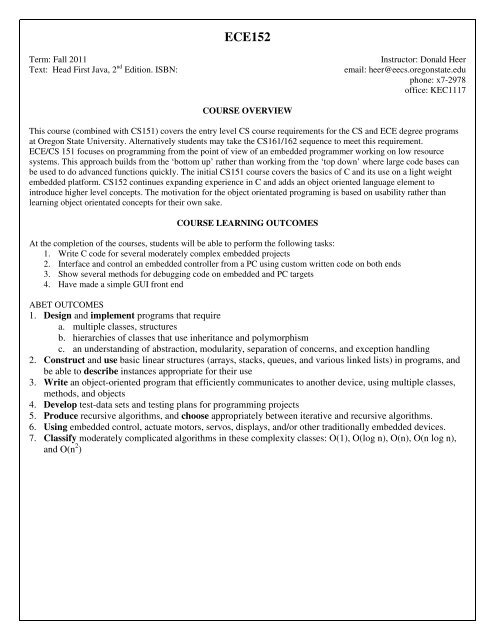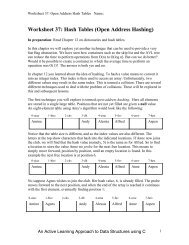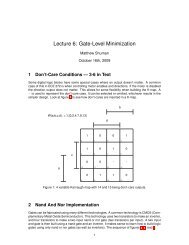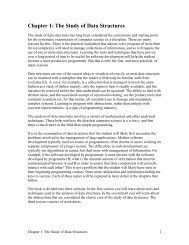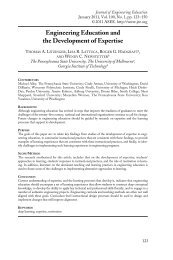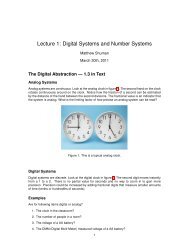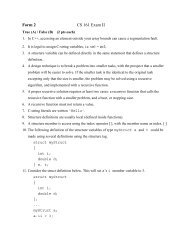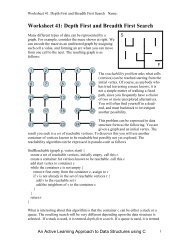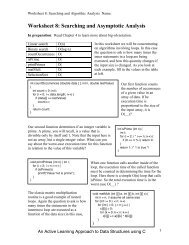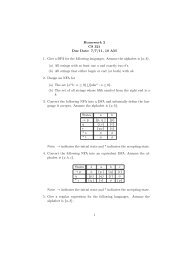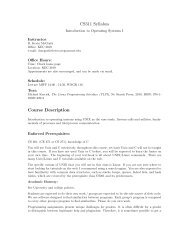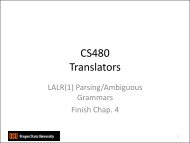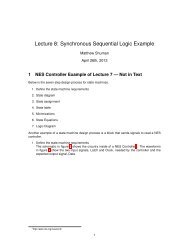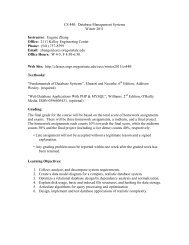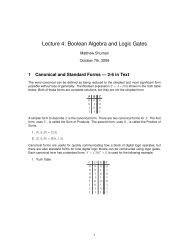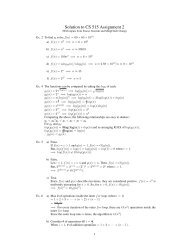Syllabus - Classes - Oregon State University
Syllabus - Classes - Oregon State University
Syllabus - Classes - Oregon State University
Create successful ePaper yourself
Turn your PDF publications into a flip-book with our unique Google optimized e-Paper software.
ECE152<br />
Term: Fall 2011<br />
Text: Head First Java, 2 nd Edition. ISBN:<br />
Instructor: Donald Heer<br />
email: heer@eecs.oregonstate.edu<br />
phone: x7-2978<br />
office: KEC1117<br />
COURSE OVERVIEW<br />
This course (combined with CS151) covers the entry level CS course requirements for the CS and ECE degree programs<br />
at <strong>Oregon</strong> <strong>State</strong> <strong>University</strong>. Alternatively students may take the CS161/162 sequence to meet this requirement.<br />
ECE/CS 151 focuses on programming from the point of view of an embedded programmer working on low resource<br />
systems. This approach builds from the ‘bottom up’ rather than working from the ‘top down’ where large code bases can<br />
be used to do advanced functions quickly. The initial CS151 course covers the basics of C and its use on a light weight<br />
embedded platform. CS152 continues expanding experience in C and adds an object oriented language element to<br />
introduce higher level concepts. The motivation for the object orientated programing is based on usability rather than<br />
learning object orientated concepts for their own sake.<br />
COURSE LEARNING OUTCOMES<br />
At the completion of the courses, students will be able to perform the following tasks:<br />
1. Write C code for several moderately complex embedded projects<br />
2. Interface and control an embedded controller from a PC using custom written code on both ends<br />
3. Show several methods for debugging code on embedded and PC targets<br />
4. Have made a simple GUI front end<br />
ABET OUTCOMES<br />
1. Design and implement programs that require<br />
a. multiple classes, structures<br />
b. hierarchies of classes that use inheritance and polymorphism<br />
c. an understanding of abstraction, modularity, separation of concerns, and exception handling<br />
2. Construct and use basic linear structures (arrays, stacks, queues, and various linked lists) in programs, and<br />
be able to describe instances appropriate for their use<br />
3. Write an object-oriented program that efficiently communicates to another device, using multiple classes,<br />
methods, and objects<br />
4. Develop test-data sets and testing plans for programming projects<br />
5. Produce recursive algorithms, and choose appropriately between iterative and recursive algorithms.<br />
6. Using embedded control, actuate motors, servos, displays, and/or other traditionally embedded devices.<br />
7. Classify moderately complicated algorithms in these complexity classes: O(1), O(log n), O(n), O(n log n),<br />
and O(n 2 )
Academic Dishonesty<br />
At <strong>Oregon</strong> <strong>State</strong> <strong>University</strong> academic dishonesty is defined by the <strong>Oregon</strong> Administrative Rules 576-015-0020.1.a-c as:<br />
An intentional act of deception in which a student seeks to claim credit for the work or effort of another person or uses<br />
unauthorized materials or fabricated information in any academic work.<br />
Academic dishonesty includes:<br />
• CHEATING - use or attempted use of unauthorized materials, information or study aids or an act of deceit by<br />
which a student attempts to misrepresent mastery of academic effort or information. This includes unauthorized<br />
copying or collaboration on a test or assignment or using prohibited materials and texts.<br />
• FABRICATION - falsification or invention of any information (including falsifying research, inventing or<br />
exaggerating data and listing incorrect or fictious references.<br />
• ASSISTING - helping another commit an act of academic dishonesty. This includes paying or bribing someone<br />
to acquire a test or assignment, changing someone's grades or academic records, or taking a test/doing an<br />
assignment for someone else (or allowing someone to do these things for you). It is a violation of <strong>Oregon</strong> state law<br />
to create and offer to sell part or all of an education assignment to another person (ORS 165.114).<br />
• TAMPERING - altering or interfering with evaluation instruments and documents.<br />
• PLAGIARISM - representing the word or ideas of another person as one's own OR presenting someone else's<br />
words, ideas, artistry or data as one's own. This includes copying another person's work (including unpublished<br />
material) without appropriate referencing, presenting someone else's opinions and theories as one's own, or working<br />
jointly on a project, then submitting it as one's own.<br />
PLEASE NOTE: We will be checking code that is supposed to be done individually using a program called MOSS that<br />
automates the process of finding direct code copying. We also reference previous courses submissions. You MUST write<br />
your own code.<br />
IEEE Code of Ethics<br />
As a community of Electrical and Computer Engineers, we have a duty to present ourselves and our profession to each<br />
other and the public in the best light possible. The IEEE has a code of Ethics that should always be considered. It reads:<br />
“We, the members of the IEEE, in recognition of the importance of our technologies in affecting the quality of life<br />
throughout the world, and in accepting a personal obligation to our profession, its members and the communities we<br />
serve, do hereby commit ourselves to the highest ethical and professional conduct and agree:<br />
1. to accept responsibility in making decisions consistent with the safety, health and welfare of the public,<br />
and to disclose promptly factors that might endanger the public or the environment;<br />
2. to avoid real or perceived conflicts of interest whenever possible, and to disclose them to affected<br />
parties when they do exist;<br />
3. to be honest and realistic in stating claims or estimates based on available data;<br />
4. to reject bribery in all its forms;<br />
5. to improve the understanding of technology, its appropriate application, and potential consequences;<br />
6. to maintain and improve our technical competence and to undertake technological tasks for others only<br />
if qualified by training or experience, or after full disclosure of pertinent limitations;<br />
7. to seek, accept, and offer honest criticism of technical work, to acknowledge and correct errors, and to<br />
credit properly the contributions of others;<br />
8. to treat fairly all persons regardless of such factors as race, religion, gender, disability, age, or national<br />
origin;<br />
9. to avoid injuring others, their property, reputation, or employment by false or malicious action;<br />
10. to assist colleagues and co-workers in their professional development and to support them in<br />
following this code of ethics. “
Late Work Policy<br />
All late work will receive no credit. Only pre-discussed exceptions will be accepted.<br />
Grading Break Down:<br />
Labs: 40%<br />
Assignments: 20%<br />
Midterm: 15%<br />
Final: 25%<br />
Final Waiver:<br />
During the course there will be 5-8 assignments and labs that will have an extended learning option. If a student<br />
performs all of these extended learning exercises before their deadlines, they may waive the final. They may show and<br />
take the final in which case their grade will be based on the final or not, whichever results in the higher final course score.<br />
Submitting Assignments:<br />
The majority of assignments are to be submitted electronically. These submissions should be done via TEACH.<br />
Additionally students should place a copy of their files on the ENGR server when they submit to TEACH. This is to<br />
ensure in the event of a ‘computer glitch’ that there are two copies of the code on the server with proper time stamps.<br />
Some assignments will be reviewed automatically. For these assignments, the first submission will be graded and your<br />
grade sent to you via email. If you are not satisfied with the score, you may improve your code and resubmit so long as it<br />
is before the assignment deadline. The second submission will be for full credit. Each following submission will lose 10%<br />
of its score.<br />
Lab Submissions:<br />
Most labs consist of a Prelab, Lab, and study question sections. When included, prelabs sections must be typed and<br />
submitted to your TA within 5 minutes of the start of your lab. Study questions are due the week following the lab within<br />
the same 5 minutes of the next lab.<br />
All labs should be demonstrated to your TA at the beginning of lab the following week. You may only show your lab to<br />
your TA. When you demo your code, you should have a printed copy of the code on hand to give to your TA. Your TA<br />
will quickly verify the handed in code matches the code compiled and demonstrated.<br />
Course Schedule:<br />
The course schedule and details of each lecture is available on the ‘Google calendar.’ While no changes are expected,<br />
please review it periodically to double check.<br />
.


